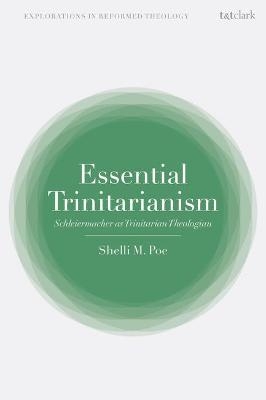
Essential Trinitarianism
T.& T.Clark Ltd (Verlag)
978-0-567-68799-9 (ISBN)
This volume argues that Schleiermacher not only calls for the doctrine’s revitalization, but also makes it the centrepiece of Protestant Christianity. Following Schleiermacher’s own thought experiment, Poe presents his doctrine of God in reverse order of its original presentation. Her examination centres on the Trinity, treating it as the keystone of the entire work, while analysing the divine attributes: love and wisdom, justice and holiness, eternity, omniscience, omnipotence, and omnipresence. When viewed from the standpoint of the conclusion, the Trinitarian shape of Schleiermacher’s theology comes to the fore. What emerges is a middle way between merely economic Trinitarianism and a full-fledged development of immanent Trinitarianism, examining divine personhood and the union of the divine with humanity.
The central thesis of this work runs boldly counter to the prevailing academic account of Schleiermacher’s doctrine of the Trinity, and offers an innovative and constructive reading. Readers will be privy to a fresh look at Schleiermacher’s doctrine of God and its importance for contemporary theology.
Shelli M. Poe is Assistant Professor of Religious Studies, Director of the Initiative for Vocational Inquiry, and Director of the interdisciplinary minor in Vocation, Ethics and Society at Millsaps College, USA.
Acknowledgements
Abbreviations
Part I: Re-reading Schleiermacher
I. Chapter One: Introduction
a. Schleiermacher’s Critics
1. Subjectivism
2. Sexism and the Privatization of Christianity
3. Uncritical Adoption of Enlightenment Thinking
4. Non-Trinitarian Theology
b. Complexity in Trinitarian Theologies
c. Chapter Overview
1. Part One: Re-reading Schleiermacher
2. Part Two: Schleiermacher and the Trinity
3. Part Three: Tensions and Connections
d. A Final Word
II. Chapter Two: Schleiermacher’s Approach
a. An Eternal Covenant between Christian Faith and Academic Inquiry
1. Theology in the Modern University
2. Theology for a Modern Church
3. Christian Union in Protestant Prussia
4. Methodological Barriers to Schleiermacher’s Goals
5. Similarities with Calvin
b. Anti-speculative Doctrine
1. Knowledge or Consciousness of God and Self
2. Holistic Christian Faith
3. Divine Activity in Relation to Creation
c. Different Conceptual Structures in the Doctrine of God
1. Duplex Cognitio Dei
2. Simplex Cognitio Dei
d. Anticipating Implications for Trinitarianism
Part II: Schleiermacher and the Trinity
III. Chapter Three: Rejecting Immanent Trinitarianism
a. Schleiermacher’s ‘Trinitarian Treatise’
1. Potential Explanations for Misreadings
2. The Placement of the ‘Trinitarian Treatise’
3. Calls for Protestant Revitalization
b. Anti-speculative Objection
1. Dogmatics as Part of Historical Theology
2. Similarities with Immanent Trinitarianism
3. The New Testament as the Distinctive Source for the Development of the Doctrine of the Trinity
c. Conceptual Difficulties
1. Inequality of Persons and Essence
2 Inequality of Causality and Persons
3. The Doctrine of the Trinity as a Stumbling Block
d. Sabellianism Reconsidered
IV. Chapter Four: Constructing Essential Trinitarianism
a. Three Distinctions-in-Relation
1. Causality
2. Love
3. Wisdom
4. Essential Trinitarianism
b. Personhood and the Divine Life
1. Schleiermacher’s Relation to Spinoza
2. Rejecting ‘Personality’, Affirming ‘the Living God’
3. Using Personal Analogies
c. Toward Divine Personhood
1. Transcendental Reasoning
2. Communicability of Difference
3. Activity in Relation to Matter
4. Christologically-Centered Relationality
5. Discerning Attention and Circumscribed Ineffability
V. Chapter Five: Developing Economic Trinitarianism
a. Methodological Divergences
1. Between Divine Attributes: Christ and the Church
2. Interrupting a Strictly Backwards Reading
b. Jesus of Nazareth
c. Spirit in the Church
d. Preparation for the Union of the Divine Essence with Human Nature
1. Holiness
2. Justice
e. Relating the Doctrines of the Immanent and Economic Trinity
1. Hesitations about a Doctrine of Appropriation
2. Schleiermacher’s Doctrine of the Trinity as Eternal and Temporal
Part III. Tensions and Connections
VI. Chapter Six: Divine Alterity
a. Via Causalitatis
b. Apophatic Attributes
1. Eternity
2. Omnipresence
3. Omnipotence
4. Omniscience
c. Coherence of Alterity and Trinity
VII. Chapter Seven: Consciousness of God
a. Distinguishing Christian God-Consciousness from General Religious Consciousness
1. Christian God-Consciousness
2. Cause and Effect, Subject and Object
b. Christomorphic Anthropology
VIII. Chapter Eight: Conclusion
a. Apophasis and Kataphasis
b. Christian Ecumenism
c. Ecotheology
Bibliography
Index of Primary Sources
Index of Authors
| Erscheinungsdatum | 29.04.2019 |
|---|---|
| Reihe/Serie | T&T Clark Explorations in Reformed Theology |
| Verlagsort | Edinburgh |
| Sprache | englisch |
| Maße | 156 x 234 mm |
| Gewicht | 304 g |
| Themenwelt | Geisteswissenschaften ► Religion / Theologie ► Christentum |
| ISBN-10 | 0-567-68799-6 / 0567687996 |
| ISBN-13 | 978-0-567-68799-9 / 9780567687999 |
| Zustand | Neuware |
| Haben Sie eine Frage zum Produkt? |
aus dem Bereich


